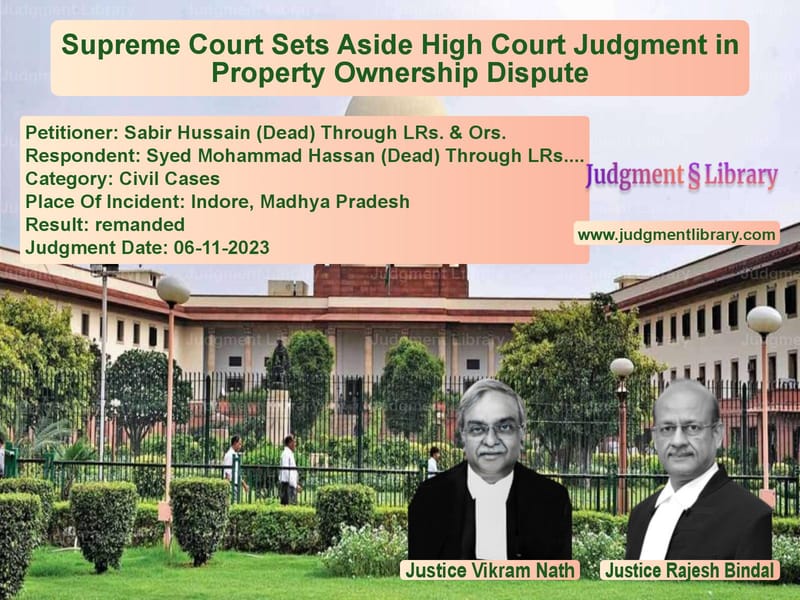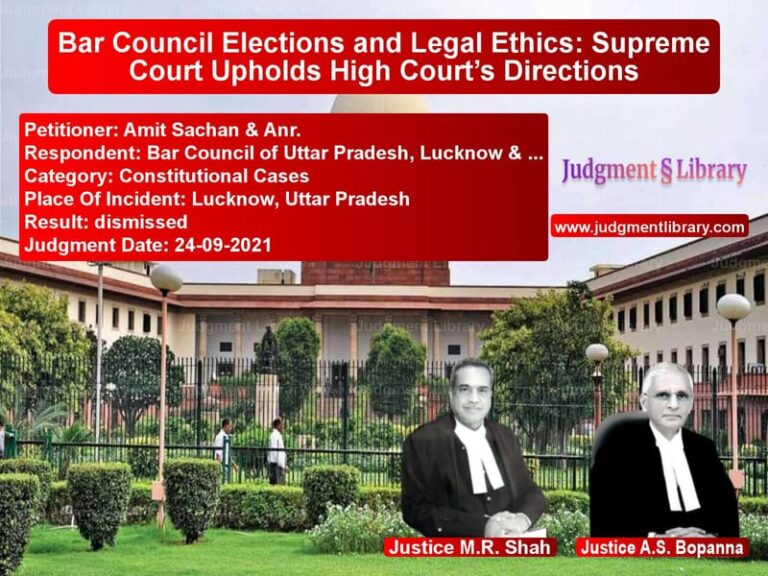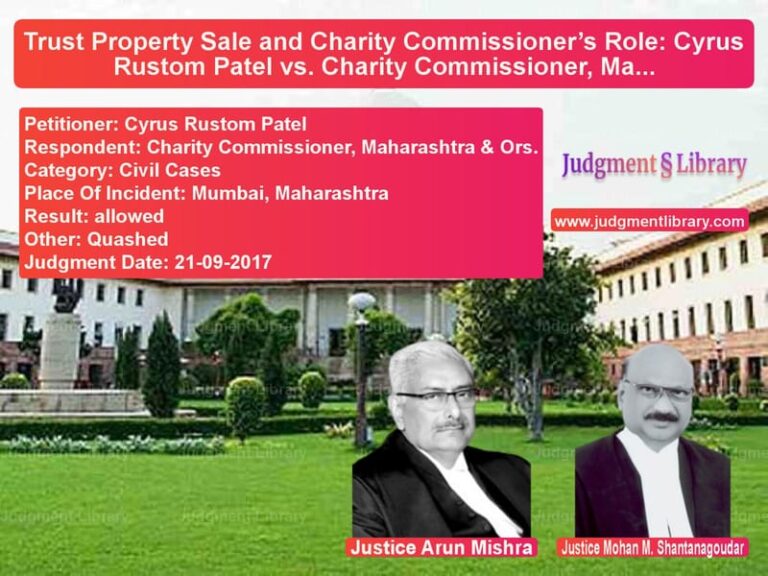Supreme Court Sets Aside High Court Judgment in Property Ownership Dispute
The Supreme Court of India recently ruled in the case of Sabir Hussain (Dead) Through LRs. & Ors. vs. Syed Mohammad Hassan (Dead) Through LRs. & Anr., addressing a long-standing property ownership dispute. The key issue in the case was whether the sale of a disputed property was valid and whether the High Court had properly evaluated the evidence while reversing a trial court’s ruling. The Supreme Court set aside the High Court’s judgment, sending the matter back for reconsideration.
Background of the Case
The property in dispute is House No. 24, Chhatripura Main Road, Indore. It was originally purchased by Kallu Bhai in 1913 in the name of Mohd. Jafar, who was a three-year-old child at the time. Kallu Bhai raised Syed Mohammad Hassan after the death of his mother. In 1975, Mohd. Jafar entered into an agreement to sell the property to Raza Hussain. A registered sale deed was executed soon after.
The dispute arose when Syed Mohammad Hassan claimed ownership of the property, arguing that he had been residing in it for decades and had an adverse possession claim. In response, Raza Hussain filed a civil suit in 1977 for possession and damages.
The trial court ruled in favor of Raza Hussain, but the High Court overturned the decision, casting doubt on the validity of the sale deed and favoring Syed Mohammad Hassan.
Arguments by the Petitioner (Legal Heirs of Sabir Hussain)
The petitioners contended:
- The High Court reversed the trial court’s well-reasoned judgment without thoroughly discussing the evidence.
- The sale deed executed by Mohd. Jafar was a legally registered document, and its authenticity should not have been questioned without strong grounds.
- The respondent had received multiple legal notices in 1976 asking him to vacate the property, but he did not respond.
- There was no clear proof that the respondent had an adverse possession claim, as he was initially staying in the house with permission.
- The High Court failed to consider crucial witness statements, including that of Dr. Badrul Hasan Naqvi, who testified that the sale deed was signed in the hospital in the presence of the Registrar.
Arguments by the Respondent (Legal Heirs of Syed Mohammad Hassan)
The respondents countered these claims by arguing:
- The sale deed was executed in suspicious circumstances, as Mohd. Jafar was ill at the time and the transaction was completed in an unusually short period.
- The signatures on the agreement to sell and the sale deed did not match, raising concerns about forgery.
- Syed Mohammad Hassan had been living in the house for many years and had developed ownership rights through adverse possession.
- The respondent had been collecting rent from tenants, which demonstrated his control over the property.
Supreme Court’s Key Observations
The Supreme Court carefully examined the procedural flaws in the High Court’s judgment and found that:
- The High Court had failed to fully discuss and analyze the evidence before reversing the trial court’s findings.
- Registered sale deeds are legally binding and should not be disregarded without concrete proof of fraud.
- The High Court ignored critical witness testimony from Dr. Badrul Hasan Naqvi, who confirmed that the sale deed was executed in the hospital in the presence of the Registrar.
- The High Court did not properly evaluate the expert handwriting analysis, which stated that the signatures on key documents differed.
- The trial court had provided detailed reasoning, which the High Court failed to properly consider.
Key Excerpt from the Judgment
“The First Appellate Court is required to record its findings dealing with all the issues of law as well as fact and with the evidence, oral as well as documentary, led by the parties. The judgment of the First Appellate Court must show conscious application of mind.”
The Supreme Court reiterated that appellate courts must carefully examine all evidence before overturning trial court decisions.
Final Judgment and Directions
The Supreme Court ruled:
- The High Court’s judgment was set aside due to its failure to thoroughly analyze the evidence.
- The matter was remitted back to the High Court for fresh consideration.
- The Supreme Court directed the High Court to give priority to the case, considering its age.
- The Supreme Court clarified that it had not ruled on the merits of the case and that the High Court should make an independent determination.
This ruling underscores the importance of a thorough review process in appellate courts, ensuring that legal documents such as sale deeds are not disregarded without compelling evidence. The case will now return to the High Court for reconsideration.
Petitioner Name: Sabir Hussain (Dead) Through LRs. & Ors..Respondent Name: Syed Mohammad Hassan (Dead) Through LRs. & Anr..Judgment By: Justice Vikram Nath, Justice Rajesh Bindal.Place Of Incident: Indore, Madhya Pradesh.Judgment Date: 06-11-2023.
Don’t miss out on the full details! Download the complete judgment in PDF format below and gain valuable insights instantly!
Download Judgment: sabir-hussain-(dead)-vs-syed-mohammad-hassan-supreme-court-of-india-judgment-dated-06-11-2023.pdf
Directly Download Judgment: Directly download this Judgment
See all petitions in Property Disputes
See all petitions in Succession and Wills
See all petitions in Specific Performance
See all petitions in Contract Disputes
See all petitions in Judgment by Vikram Nath
See all petitions in Judgment by Rajesh Bindal
See all petitions in Remanded
See all petitions in supreme court of India judgments November 2023
See all petitions in 2023 judgments
See all posts in Civil Cases Category
See all allowed petitions in Civil Cases Category
See all Dismissed petitions in Civil Cases Category
See all partially allowed petitions in Civil Cases Category







